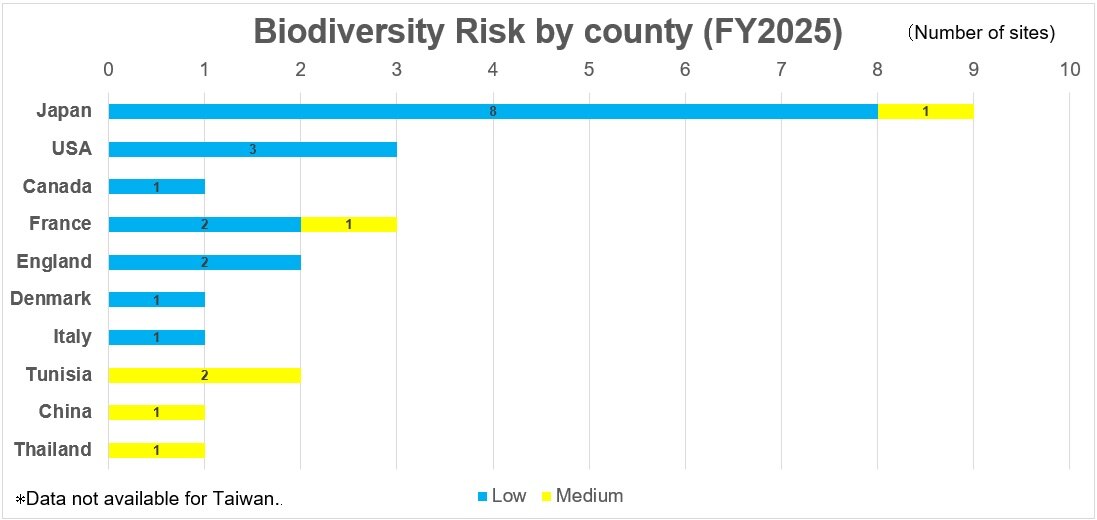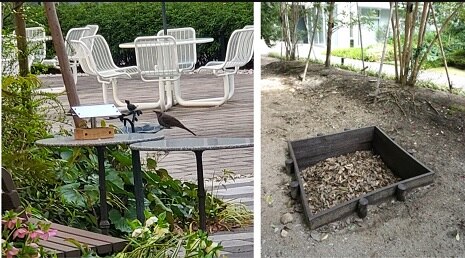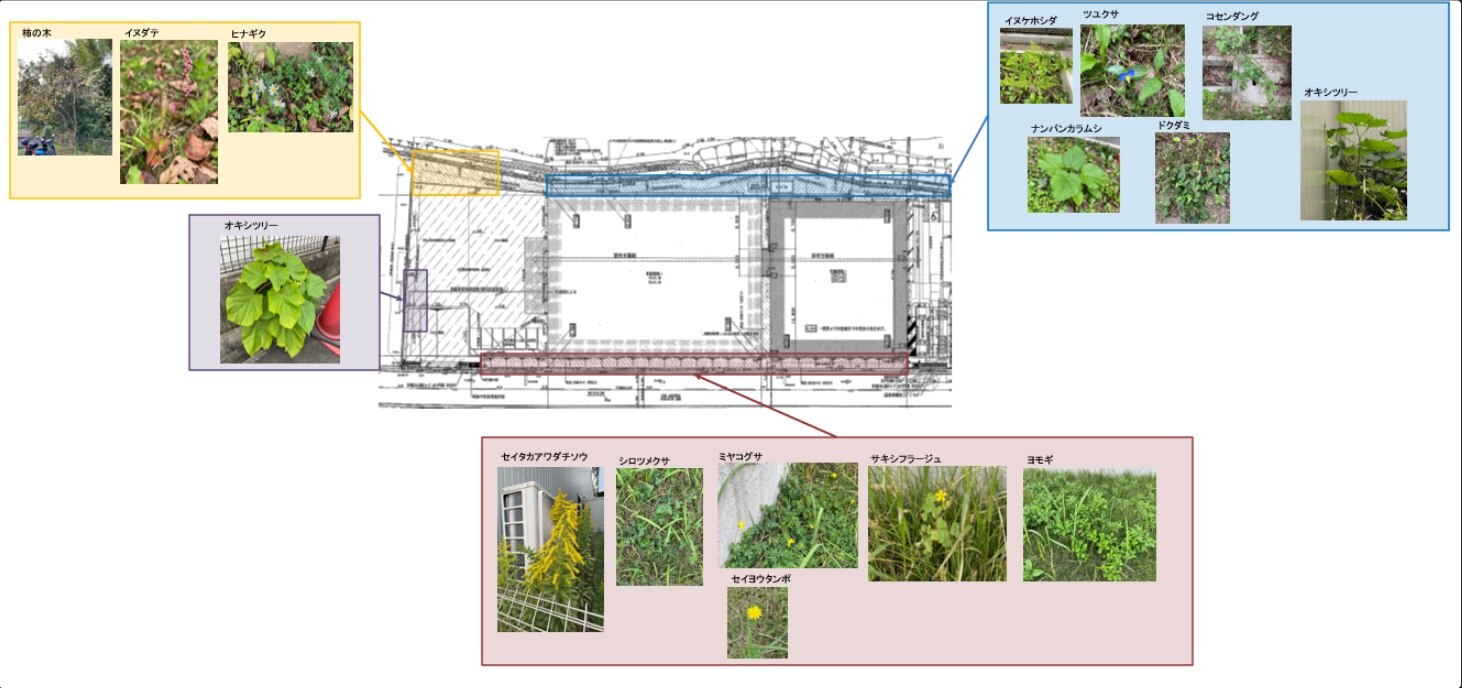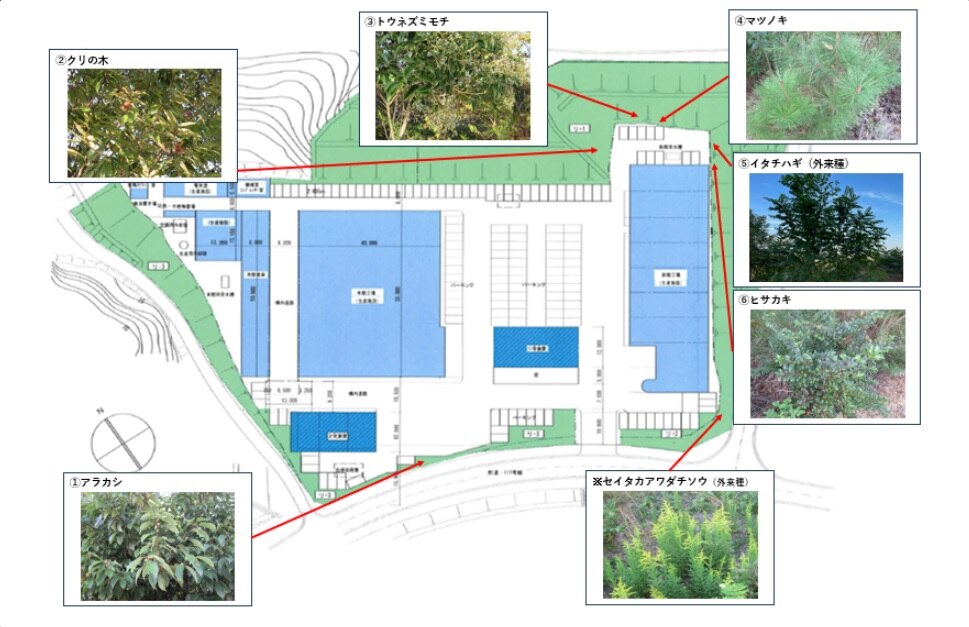Initiatives for Nature
■TOC■(Click the following each content to jump.) |
BiodiversityBasic ConceptWe consider that biodiversity creates diverse values and services such as water, plants, and oxygen on the earth, and it is one of the most important existences that support the IDEC Group's business continuity. We also think that biodiversity is an important issue to be addressed as well as climate change. In October 2022, IDEC approved and signed the statement of BUSINESS FOR NATURE at COP15 for mandatory assessment and disclosure of biodiversity framework, and we will proceed to prepare for the information disclosure of the impact of our business on the environment and relating-environment for accomplishing 2050 vision of "societies in harmony with nature" stated by Convention on Biological Diversity. Moreover, based on the framework of "Governance", "Strategy", "Risk Management", and "Metrics and Targets" of four indexes for Taskforce on Nature-related Financial Disclosures (TNDF), our Environmental Strategy Committee which chairperson is the Senior Executive Officer in charge of the environment, has considered the future directions and code of conduct for biodiversity. |
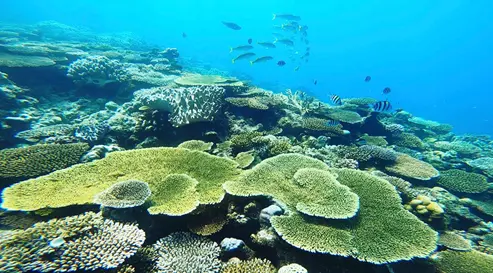 |
|
Analysis of Biodiversity RisksSince FY2024, we have conducted the analysis and assessment of IDEC group's biodiversity risks in order to define indexes that helps to study impacts on biodiversity by IDEC group's business activities and monitor biodiversity results. As an assessment tool, we adopt Biodiversity Risk Filter developed by World Wide Fund for Nature (WWF) to quantify biodiversity risks by country. In addition, we identify top 10 biodiversity risk indicators of of the whole group. The following graph shows the quantified results of the IDEC group's biodiversity risks based on the risk assessments of each site by country. Overall assessment of 24 sites in the world were rated as low or medium risks, and there was no site with high biodiversity risk. | ||
| ||
The following graph shows the quantified results of the IDEC group's top 10 biodiversity risks based on the assessment of each site. The biodiversity risk indexes with the high risk are landslides, tropical cyclone and water scarcity. The percentage of locations with high risk overall was about the same as last year, and there was no deterioration in the risk score. About "wildfire hazard," the number of locations with high risk decreased, but the number of locations with medium risk increased significantly. The number of IDEC Group sites registered in the Biodiversity Risk Filter was changed from 19 in FY2024 to 24 in FY2025, and it is difficult to compare the results. The number of sites classified as having a medium risk of wildfire and the percentage of the total were 6 sites (31.6%) in FY2024 and 15 sites (60.0%) in FY2025. Since the beginning of 2025, large-scale wildfires have occurred in Los Angeles, USA, Australia, South Korea, and other places, and in Japan, wildfires have occurred in Iwate, Okayama, and Ehime prefectures, causing forest loss. Going forward, we plan to track changes in the risk score for each climate-related biodiversity risk index and grasp and analyze the current situation for each site assessed as being at high risk. In addition to TCFD disclosures, we plan to disclose nature-related financial information based on the TNFD framework, and utilize the Leveraging Environmental and Natural Capital for Performance (LEAP) approach to assess risks and opportunities through the Environmental Strategy Committee. | ||
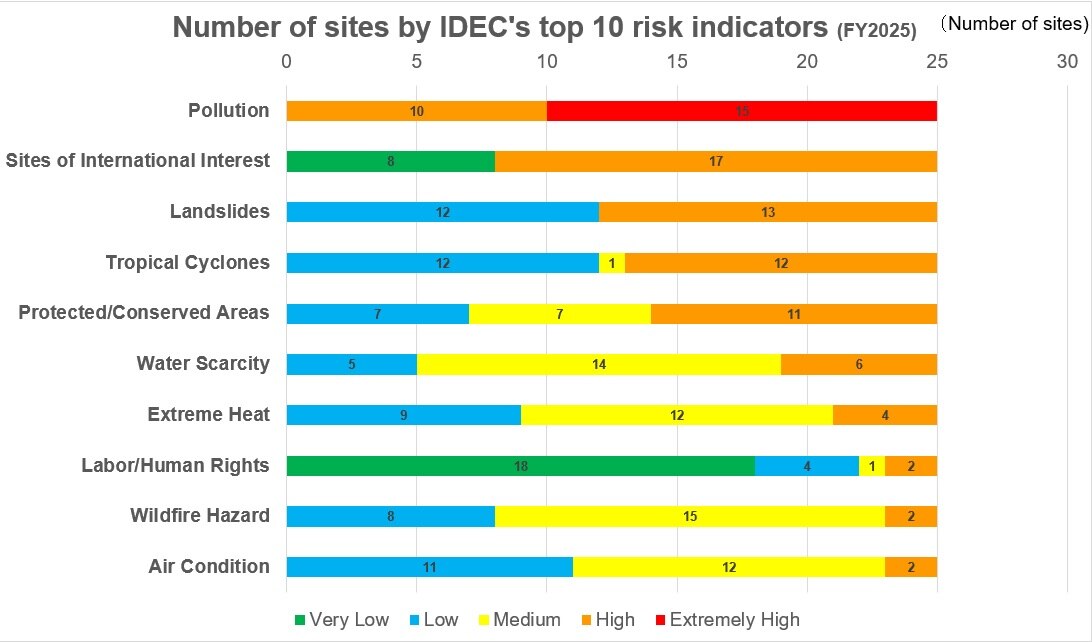 Source: WWW Risk Filter Suite | ||
Greening of IDEC Group's Business SitesWe have addressed to preserve biodiversity through greening of our business base sites. | ||
IDEC's Head Office <Courtyard> In June 2018, the courtyard was renovated and more than 30 kinds of trees including local varieties of Japan were planted for the recreation of a forest dominated by native species of the region. We named it "Izumi Forest." In March 2023, the IDEC head office’s green space was certified as a private business green space with excellent conservation and creation activities under the Social and Environmental Green Evaluation System Operation, Management and Active use program (SEGES OMA) of the Organization for Landscape and Urban Green Infrastructure. In 2024, we have maintained the evaluation of "Excellent Stage 2" certified by SEGES. In the Izumi Forest, employees have handcrafted food boxes using recycled materials and placed them with husk food such as barnyard millet and foxtail millet, as well as sunflower seeds harvested at the Fukusaki Plant. Birdbaths are also set up as watering holes for wild birds to take a break, and eco-stacks are set up as habitats for small creatures such as insects and reptiles. |
|
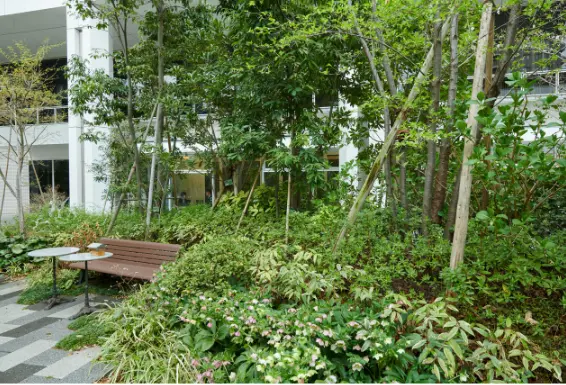 |
|
Amagasaki Plant As part of our activities to help employees experience the seasons, we grow sunflowers every year. The harvested seeds are not only distributed to employees, but are also used as food for wild birds in the Izumi Forest of the company's headquarters. | |
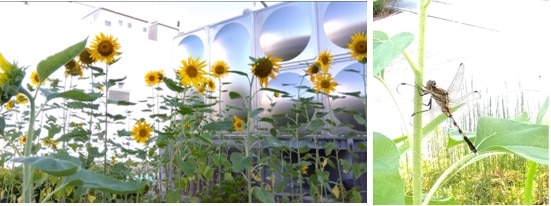 | |
Fukusaki Plant We grow seasonal flowers such as salvia, the flower of Fukusaki Town, and sunflowers. In the future, we are considering using it as a place to protect and cultivate native species. | |
 | |
Environmental EducationThe environmental education conducted within the company in FY2024 took place on the intranet and included an explanation of biodiversity and living creatures in the four areas of atmosphere, freshwater, ocean, and land defined by the TNFD (Task Force on Nature-related Financial Disclosures), as well as an introduction of IDEC's eco-friendly products and examples of estimated environmental investments using internal carbon pricing (ICP). The original contents created by the Environmental Strategy Committee are made available internally in both Japanese and English. More and more departments are working on e-learning as part of their ISO environmental goals, and the number of participants is increasing every year, with some departments even involving every member. |
||
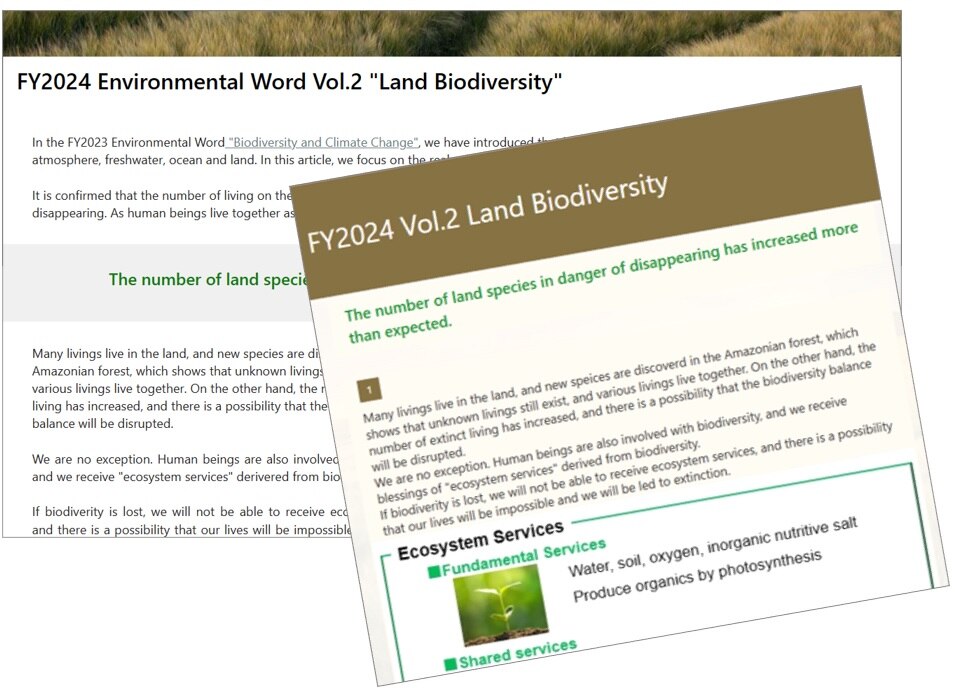 | ||
Survey of wildlife at business premises Hoping to contribute to environmental conservation by understanding the impact on the local ecosystem around business sites, members of the business sites took the lead in conducting a wildlife survey around the head office, Takino, Fukusaki, Amagasaki, and IDEC Logistics Service (Tatsuno City). We also received advice from an external inspection organization for SEGES' "Fostering Green" certification, which was acquired by our headquarters in FY2024, and eradicated invasive species (such as Solidago altissima) to prevent damage to the ecosystem. | ||
▲Survey results of IDEC Logistics Service (Tatsuno city) |
▲Survey results of Takino Site | |
Environmental Activities with the Participation of Employees"Biodiversity" Photo Contest (Global) We hold the Sustainability Month in every October globally. In FY2024, we held a photo contest with the theme of "measures for preventing global warming", and there were many applications from all over the world. |
||
 |
Biodiversity through "food"In order to have employees feel familiarity with biodiversity through food, dishes with sustainable materials were provided at the cafeteria of head office during the sustainable month in October. | ||
Cafeteria of the IDEC Head Office (Japan) Salmon cream pasta used with farmed salmon and salmon roe acquired the international certified standard “ASC certification” (left photo) and lemon creme pasta with shrimp (right photo) were provided weekly. At the cafeteria of head office, the Rainforest Alliance Certified coffee is provided all through the year. |
|
|
IDEC IZUMI(Hong Kong) A “vegetable day” on which we have one meal or all meals with only vegetables was conducted at the office and the restaurant for vegetarians. Meals with only vegetables not only promote health but contribute to protect environment by forest protection and reduction of GHG and wastes in the situation of losing biodiversity caused by cattle raising | 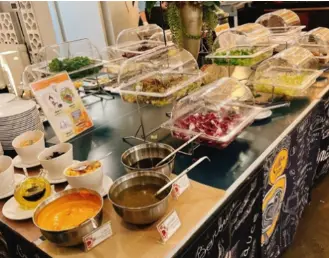 | |
Water ResourcesBasic ConceptWater resources are essential not only for human and plants, but all living organisms on the earth to live. On the other hand, approximate 2 billion people on the earth are forced to be in the condition of difficulty in using water controlled safely. It is said that 1.8 million children die annually caused by unsanitary water (Source: United Nations Information Center). Although the IDEC Group does not have any manufacturing processes or services that are heavily dependent on water resources, and most of the water resources we use are limited to water supply, we regard that water problems such as water shortage and water pollution impact on not only IDEC Group's business, but also the livings of our employees and their families. Based on the "SAVING spirit" we have cherished since the foundation, we will use water resources with gratitude and address to reduce loads caused by our business activities on nature. |
|
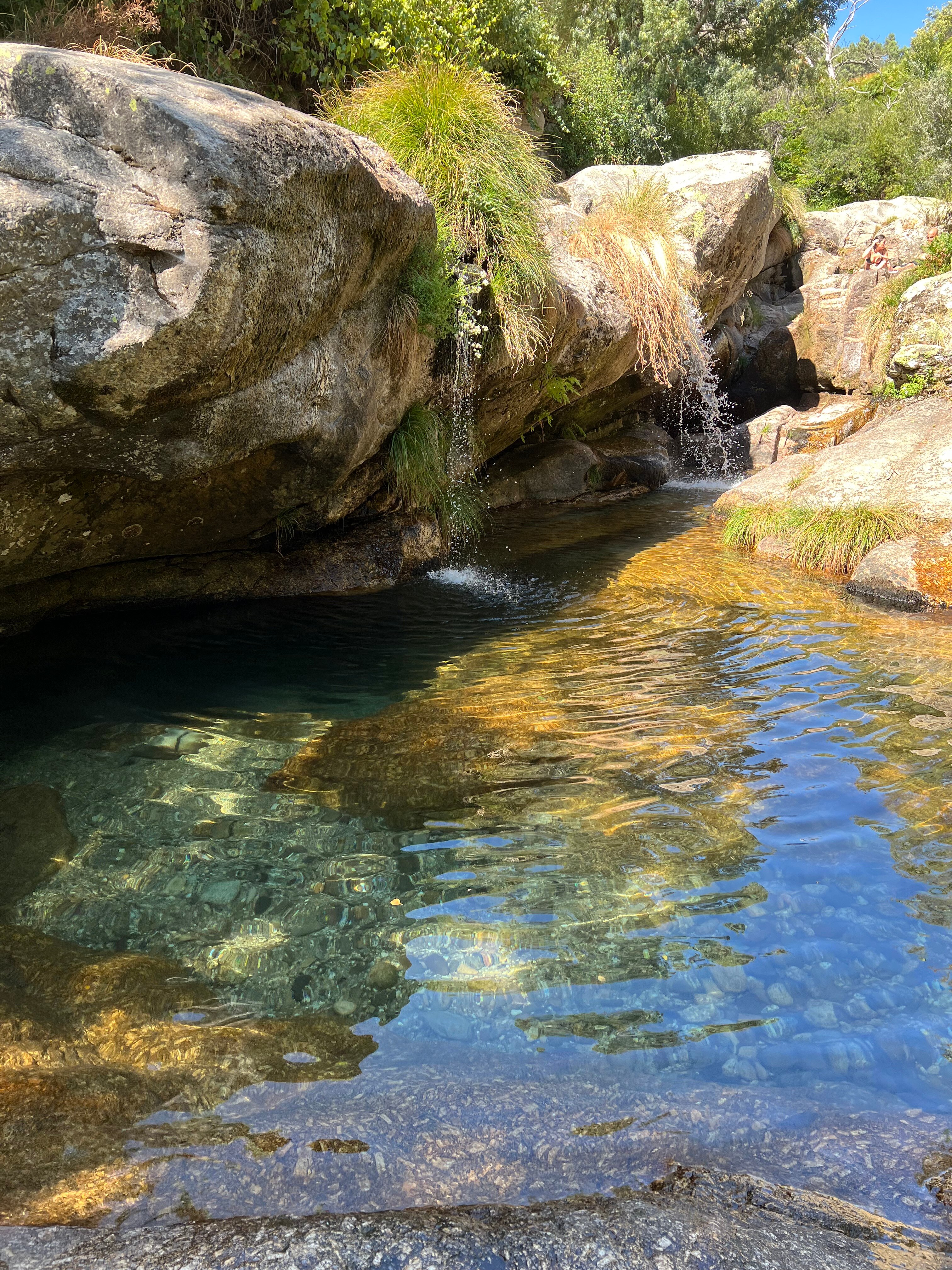 | |
Analysis of Water StressWater resource is important for business continuity of the IDEC Group as well as for all the livings in the global environment. On the other hand, due to the impact of climate change such as global warming, water risks including water shortage, concentrated heavy rains, and floods are increasing every year. For the purpose of controlling water resources properly and utilizing assessment results of water risks to business continuity, we have assessed water risks of 25 sites including manufacturing, development of all IDEC group in addition to head quarter since FY2024. As an assessment tool, we adopted Aqueduct Water Risk Atlas 4.0 developed by World Resources Institute to quantity risks of water stress, riverline flood, coastal flood, and drought of each site. In addition, we investigated the amount of water intake per site. The following is the world map that shows Aqueduct overall water risk per each IDEC site. Among 24 sites, four sites (each one site in USA and Thailand and two sites in Tunisia) were assessed as extremely high water risk, and one site in China was assessed as high water risk. There was no significant change compared to last year's results. | |
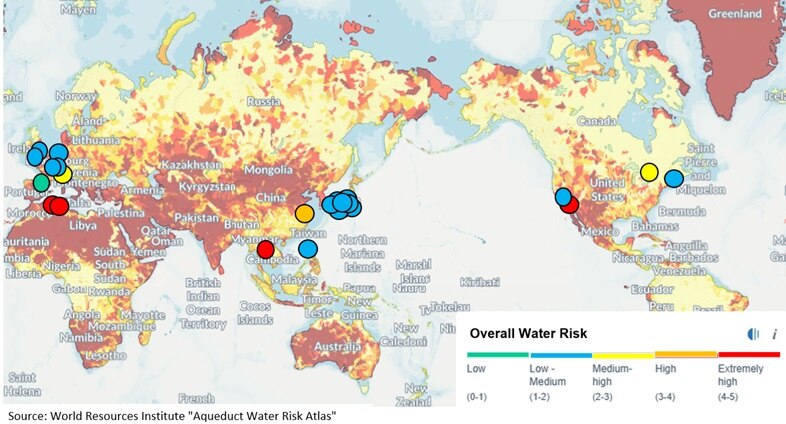 Resource: World Resources Institute "Aqueduct Water Risk Atlas" | |
The assessment results of water stress indicates that five sites (each one site in USA, China and Thailand and two sites in Tunisia) were rated as extremely high risks, and one site (in England) were rated as high risks. The amount of water intake by six sites assessed as extremely high and high risks accounts for 33.36% of the total of IDEC group's water intake. (FY2025 data) As for other risks, there are physical risks, groundwater table declines, seasonal variability, drought, riverline floods, and coastal floods, etc. We schedule to conduct risk assessments using Aqueduct once a year, and results will be updated. | 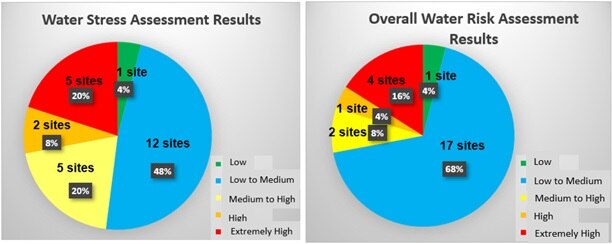 Resource: World Resources Institute "Aqueduct Water Risk Atlas" |
Rain Water Storage and its Effective Usage to Greening (Head office)Two rain water storage tanks were installed underground when the head office was constructed in 2013. Maximum 148㎥ rain water can be stored underground, and standing water has been used effectively for watering on the courtyard and sprinkling when the temperature rises. |
|
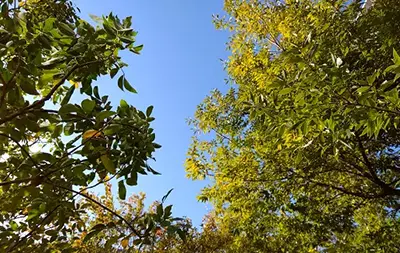 | |
Water conservation awareness campaign (IDEC IZUMI SUZHOU CO., LTD.)During the Sustainability Month in October 2023, IDEC IZUMI SUZHOU CO., LTD. (China) conducted a water-saving campaign in which all employees participated. By raising employees' environmental awareness through weekly news about the water situation on topics such as "The global water situation" and "Why water shortages occur" and by introducing specific water-saving methods, we were able to achieve a water saving of approximately 3%. We will continue to work towards saving water. | 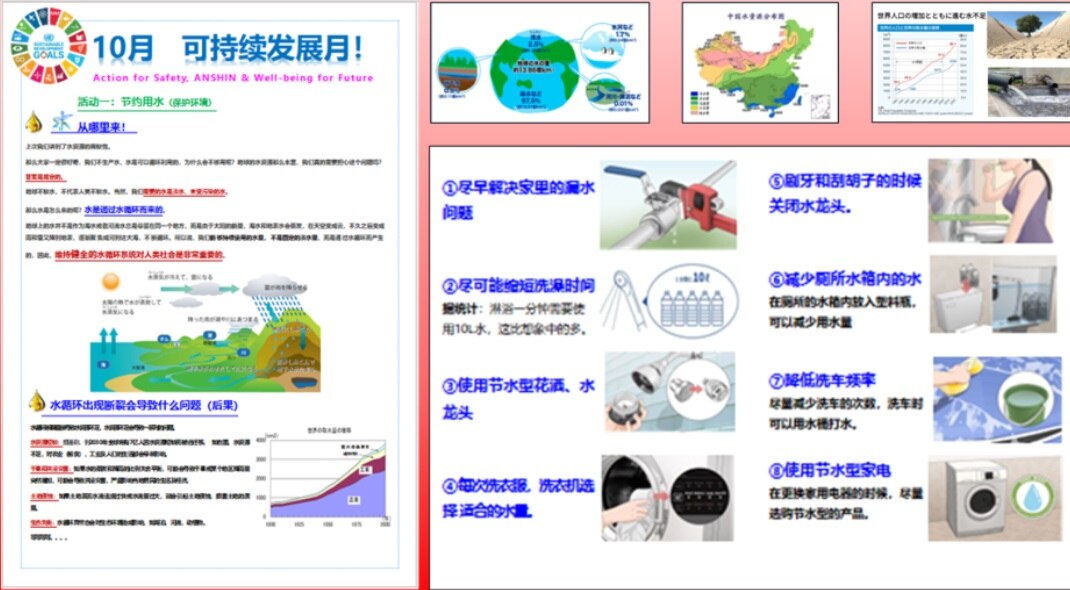 |
Public Water Supply (Japan's Data only) | |
